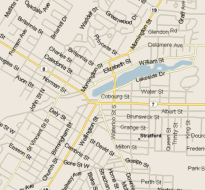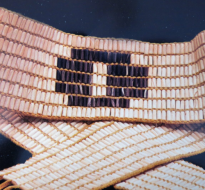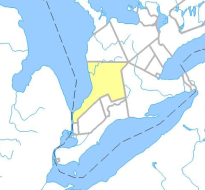
Truth, Reconciliation, and Your Library
Stratford Public Library is located on land that was shared between the Attawandaron, Anishinaabeg and Haudenosaunee peoples and is governed by two treaties.
The first treaty, the Dish with One Spoon Wampum Belt Covenant of 1701 was made between the Anishinaabeg and the Haudenosaunee Confederacy to set violence aside and peacefully share and care for the land in the Great Lakes Basin.
The second treaty, the Huron Tract Treaty of 1827, is an agreement made by eighteen Anishinaabeg Chiefs and the Canada Company, an agency of the British Crown.
As an organization that exists to make public spaces, credible resources and opportunities for learning available to everyone, the library is active in the work of truth and reconciliation. Preserving, amplifying and celebrating Indigenous stories is an important part of the work we do.
We commit to the daily work of reconciliation. This means learning and decision-making that recognizes the ongoing impact of colonialism as well as reflection, partnership and action that can make reconciliation possible.
Truth and Reconciliation Calls to Action
Stratford Public Library is committed to advancing and implementing meaningful reconciliation as addressed by the Truth and Reconciliation Commission report and in the Calls to Action. Below are the actions we've implemented to support this commitment:
Collections
-
We call on the federal government to draft new Aboriginal education legislation with the full participation and informed consent of Aboriginal peoples. The new legislation would include a commitment to sufficient funding and would incorporate the following principles:
- Providing sufficient funding to close identified educational achievement gaps within one generation.
- Improving education attainment levels and success rates.
- Developing culturally appropriate curricula.
- Protecting the right to Aboriginal languages, including the teaching of Aboriginal languages as credit courses.
- Enabling parental and community responsibility, control, and accountability, similar to what parents enjoy in public school systems.
- Enabling parents to fully participate in the education of their children.
- Respecting and honouring Treaty relationships.
-
We call upon the federal government to acknowledge that Aboriginal rights include Aboriginal language rights
-
We call upon the federal government to enact an Aboriginal Languages Act that incorporates the following principles:
- Aboriginal languages are a fundamental and valued element of Canadian culture and society, and there is an urgency to preserve them.
- Aboriginal language rights are reinforced by the Treaties.
- The federal government has a responsibility to provide sufficient funds for Aboriginal-language revitalization and preservation.
- The preservation, revitalization, and strengthening of Aboriginal languages and cultures are best managed by Aboriginal people and communities.
- Funding for Aboriginal language initiatives must reflect the diversity of Aboriginal languages.
-
We call upon Library and Archives Canada to:
- Fully adopt and implement the United Nations Declaration on the Rights of Indigenous Peoples and the United Nations Joinet-Orentlicher Principles, as related to Aboriginal peoples' inalienable right to know the truth about what happened and why, with regard to human rights violations committed against them in the residential schools.
- Ensure that its record holdings related to residential schools are accessible to the public.
- Commit more resources to its public education materials and programming on residential schools.
Our Actions
- SPL provides a dynamic collection to support all members of our community – fostering intellectual growth, lifelong learning, and leisure pursuits. We have committed to highlighting Indigenous creators, cultures, experiences and history, including materials that focus on the impacts of residential schools and the theme of reconciliation.
- In consultation with Indigenous community partners, the subject headings in our catalogue were updated in 2020-2021, replacing outdated and offensive terminology. Updates continue on a regular basis.
- SPL commits to making all national, provincial and municipal reports related to the Calls to Action available for members of our community.
- In 2023 SPL added the Moccasin Identifier Kit to the library collection to promote public awareness of the ancestral presence of First Nations, Metis and Indigenous Communities.
- In 2023, SPL expanded its language learning databases by integrating Pronunciator. This addition includes Indigenous Language offerings.
Programs & Education
-
We call upon the federal, provincial, territorial, and Aboriginal governments to develop culturally appropriate early childhood education programs for Aboriginal families.
-
We call upon the federal, provincial, territorial, and municipal governments to provide education to public servants on the history of Aboriginal peoples, including the history and legacy of residential schools, the United Nations Declaration on the Rights of Indigenous Peoples, Treaties and Aboriginal rights, Indigenous law, and Aboriginal Crown relations. This will require skills-based training in intercultural competency and conflict resolution, human rights, and anti-racism.
-
We call upon the federal, provincial, and territorial governments, in consultation and collaboration with Survivors, Aboriginal peoples, and educators, to: Make age-appropriate curriculum on residential schools, Treaties and Aboriginal peoples’ historical and contemporary contributions to Canada a mandatory education requirement for Kindergarten to Grade Twelve students.
-
We call upon the federal government, in collaboration with Aboriginal peoples, to establish, as a statutory holiday, a National Day for Truth and Reconciliation to honour Survivors, their families, and communities, and ensure that public commemoration of the history and legacy of residential schools remains a vital component of the reconciliation process.
Our Actions
- SPL maintains resource guides for information on residential schools and themes of reconciliation.
- SPL has committed to providing more resources to public education materials and programming on residential schools through Storywalks and Moccasin Identifier programming in schools.
- SPL has committed to providing resources on treaties in Ontario by posting Treaty Maps in the library.
- The National Day for Truth and Reconciliation, is marked with a moment of silence, displays and the sharing the educational materials and resources.
- SPL is committed to increasingly inclusive programming.
- SPL staff participate in training on the history and impacts of residential schools and colonization, as well as other cultural and human rights training.
Library Spaces
The Truth and Reconciliation Commission called for the recognition of Indigenous languages as a fundamental and valued part of Canadian culture and society. SPL is undertaking activities aligned with this call, and with recommendation #6 of the Truth and Reconciliation Report and Recommendations from the Canadian Federation of Library Association (CFLA-FCAB)
Our Actions
The Stratford Public Library Board acknowledges that our work takes place on the traditional territories of the Atawandaron, Anishinaabeg and Haudenosaunee peoples on territory governed by the Dish With One Spoon Wampum Belt Covenant of 1701 and the Huron Tract Treaty #29 of 1827.
Truth and Reconciliation Commission
Learn more about the Truth and Reconciliation Commission (TRC) by reading its report and findings, including the 94 Calls to Action.
National Centre for Truth and Reconciliation
Research the history and legacy of the residential school system through the National Centre for Truth and Reconciliation (NCTR).


